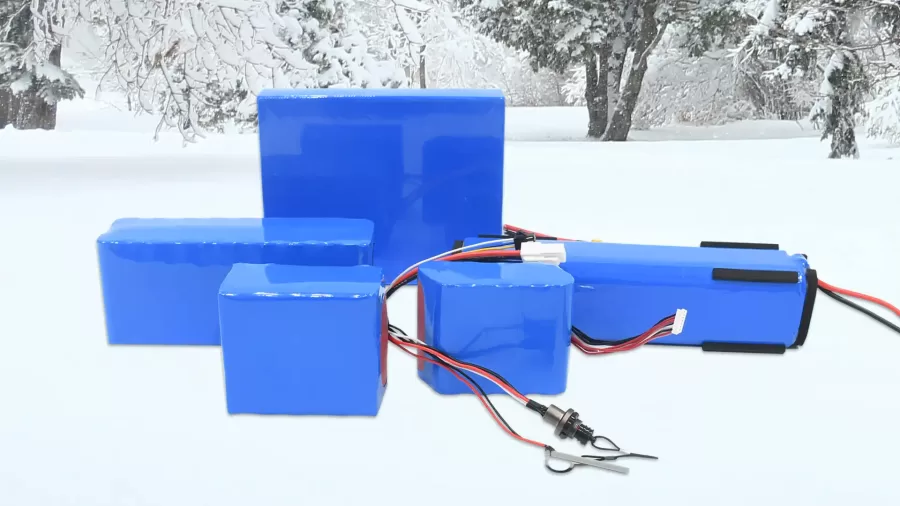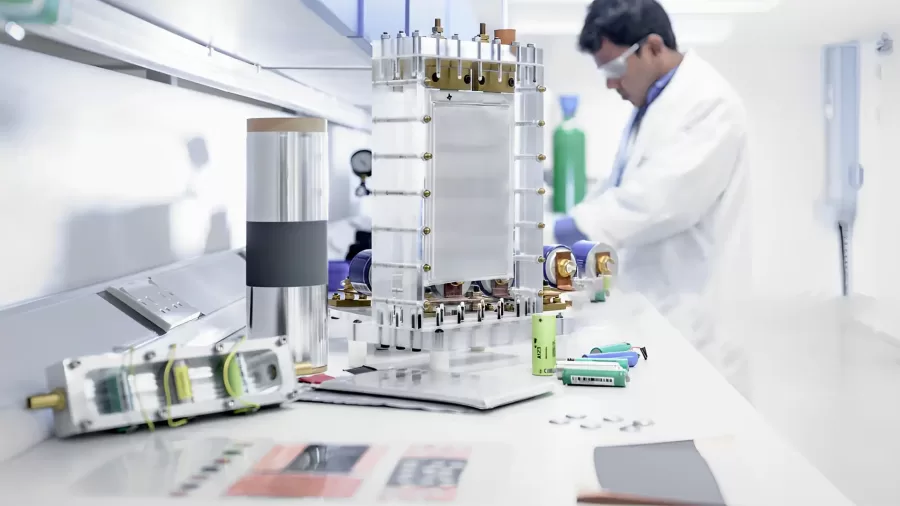Lithium batteries would degrade over time, which reduces performance and longevity reduced. Some electronic devices such as smartphones and tablets are desired for a longer life for their lithium-ion types.
At a Colombian engineering company, an innovative method of freezing lithium batteries to extend battery life has been developed and recognized by the market. Next, we will discuss the basic science, practical methods, and typical advantages of this method of freezing li-ion batteries.

Can Lithium Batteries Freeze?
The term “freeze” might imply a solidification process, which doesn’t precisely occur in lithium batteries. However, lithium batteries can indeed experience adverse effects when they are exposed to low temperatures. However, the impact of cold conditions on battery performance is significant.
What Happens to Lithium Batteries in Cold Conditions?
When lithium batteries are subjected to cold temperatures, the rate of lithium-ion transfer into and out of the anode slows down rapidly. This slowdown occurs because lithium-ion alloy plating onto the anode’s surface blocks the carbon sites, impeding the transfer of ions. Consequently, the flow of current is restricted, leading to a notable reduction in battery capacity. In essence, the term “freeze” refers to the hindrance of lithium-ion transfer through the anode.
While cold temperatures diminish battery capacity, they can also have severe effects on specific battery components. For instance, the electrolyte may stiffen, hindering smooth ion cycling and further impairing battery performance. Consequently, both voltage and output power decrease as battery capacity diminishes.
What is the Lithium Battery Freezing Temperature?
To ensure optimal performance, it’s crucial to understand the temperature ranges within which lithium batteries can operate effectively. Generally, lithium batteries perform best when stored between -4°F and 140°F, with charging recommended between 32°F and 131°F (0°C to 55°C) for safety reasons. Charging lithium batteries below freezing temperatures can result in permanent damage, significantly reducing their effectiveness. Therefore, it’s advisable to avoid charging lithium batteries in temperatures below freezing if they are intended for use in such conditions. Generally, the freezing point of most lithium-ion battery electrolytes falls within the range of approximately -40°C to -60°C. However, it’s important to note that freezing a lithium-ion battery can have adverse effects on its performance and structural integrity if not done properly. Click here to learn more about the effects of cold weather on lithium batteries.
In that case, how exactly does freezing lithium-ion batteries extend the battery lifespan?
The Reality Behind the Notion of Freezing Li-ion Batteries
In a groundbreaking research article published in Nano Letters, a team led by Yang Yuan, an esteemed Assistant Professor of Materials Science and Engineering at Columbia Engineering, unveiled an innovative method for freezing lithium batteries, aimed at optimizing their performance and lifespan. This pioneering approach holds immense potential to not only enhance the safety of lithium batteries but also extend their usability significantly. Moreover, researchers anticipate that this method could revolutionize battery technology, rendering batteries more flexible to meet the evolving demands for bendable batteries in the future.
Termed freeze-casting or ice templating, the method developed by the research team enables precise control and manipulation of the chemical structure of lithium battery electrolytes. This breakthrough allows for the production of batteries that are better suited for a wide range of applications, including handheld devices, grid-level energy storage systems, and electric vehicles.
Presently, commercial lithium batteries predominantly employ liquid electrolytes, which unfortunately possess highly flammable properties, posing substantial safety risks. Tragic incidents such as smartphone battery explosions from reputable brands have underscored the urgent need for safer alternatives. In response, researchers have diligently pursued various avenues to address these challenges and prevent similar incidents in the future.
Through enhanced focus and relentless pursuit of improvement, researchers have explored and addressed the possibility of replacing liquid electrolytes with solid-state structures. To enhance battery safety, they have developed the freeze-casting method.

The Effects and Impacts of Freeze-Casting Method
Yang’s team is exploring the idea of using solid electrolytes as a replacement for liquid electrolytes in the manufacturing of all-solid-state lithium batteries. Their focus lies in utilizing the ice templating method to produce vertically aligned ceramic solid electrolyte structures, which offer rapid lithium ion pathways and high conductivity. This innovative approach involves cooling a lithium-based battery’s liquid electrolyte along with ceramic particles, allowing the ice to grow and displace as well as concentrate the ceramic particles.
The process uses a vacuum to convert the ice into gas, forming a vertically aligned electrolyte structure. After that, a polymer joins this structure to offer flexibility and support. Yang envisions that this flexible all-solid-state lithium battery not only addresses safety concerns but also enhances the energy density of batteries, making them ideal for transportation and storage applications. Moreover, it holds great potential for manufacturing flexible or “bendable” devices.
The ice-templating or freeze-casting method, still in its developmental phase, is progressing towards manufacturing a prototype. Once it succeeds, this milestone will significantly impact the battery industry, marking a major leap forward in battery technology. The ongoing research holds promise for revolutionizing the capabilities of lithium batteries, offering enhanced performance and versatility for various applications. With continued advancements, the program aims to fulfill expectations and deliver tangible benefits for future energy storage solutions.
The Benefits of Freezing Lithium Batteries
CM Batteries as a professional lithium battery manufacturer, understands the importance of maximizing battery lifespan and performance. Let’s break down the effects of freezing lithium batteries in simpler terms to shed light on its benefits for everyday users.
Lithium-based batteries utilize liquid electrolytes, which are highly flammable. Simply put, subjecting these batteries to high temperatures or charging them too rapidly induces stress. This stress diminishes the battery’s ability to retain charge, especially when exposed to prolonged high temperatures or kept fully charged for extended periods. Excessive stress takes its toll, significantly reducing the battery’s lifespan.
However, storing these batteries in a cool environment after charging and shielding them from heat yields positive outcomes. Freezing lithium batteries helps alleviate stress, offering several benefits.
Freezing batteries slow down the chemical reactions, reducing self-discharge and preventing charge loss over time. Some even claim that freezing can revive weak or dead batteries.
Are Lithium-Ion Batteries Restored in Freezers?
The temperature rises as a result of the lithium’s continuous movement in lithium-ion batteries. Because of this, it’s a good idea to maintain the battery either cool or at room temperature. Ideally, you should never have considered storing your batteries in a warm basement or under bright sunlight. Your battery will last less time if it is exposed to heat. Thus, if you detect that the lithium-ion battery is overheating, you can recover it by putting it in the freezer.
However, you should make sure that your battery doesn’t become wet if you think of freezing it. Before putting the Li-ion battery in the freezer, it would be ideal if you sealed it in an airtight bag. You can store the battery in the freezer for about 24 hours by placing it in a tightly sealed bag to prevent moisture contact. Due to the fact, the moisture can harm your battery in several ways. It is advised to avoid placing your battery near a freezer.
In summary, while the freeze-casting method continues to undergo development, the concept of freezing lithium-ion batteries offers a logical approach to extending their service life. As the industry evolves, we look forward to incorporating new technologies and methodologies into our battery manufacturing processes to deliver superior products to our customers.


